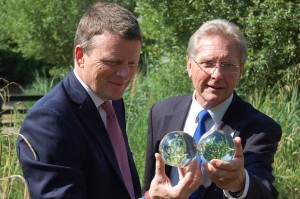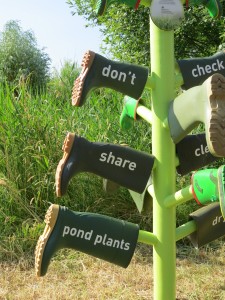Educational exhibit on dangerous plants unveiled in London
A colourful exhibit which helps gardeners and pond owners and to avoid the spread of damaging invasive non-native plants has been opened at London Wetland Centre by Environment Minister Richard Benyon.

Invasive non-native plants and animals cost the British economy at least £1.7bn each year. Water plants in particular spread easily – even the tiniest dropped fragment can grow into huge dense mats which choke native British wildlife of light, space, oxygen and nutrients.
Gardeners and pond owners can help to stop the invasion by composting plants carefully and not sharing them between ponds.
But they all need to know what they’re looking for. So, with the help of Defra funding, WWT has made lifelike models of the six worst invasive water plants which are prone to escape in Britain and pointedly housed them in cages to show they need to be contained in order to protect British wetlands!
Five of the six plants (listed below) will be banned from being sold in England and Wales from next April. The new exhibit will support that ban by showing nearly 200,000 visitors a year to London Wetland Centre why these plants are such a problem, and how they too can help to protect Britain’s wetlands.
Environment Minister, Richard Benyon said:
“Invasive non-native species pose a real threat to both the environment and to the economy.
“This exhibit shows the damage that some plants can cause if left unchecked.”
Wildfowl & Wetlands Trust Chief Executive Martin Spray CBE said:
“Invasive plants are a major threat to wetlands, which are home to more native wildlife and plant species in Britain than any other habitat.
“WWT Wetland Centres are a great place to have fun finding out how beautiful wetlands are, how they affect our lives, and how everyday things we do can make a difference.
“Just composting one plant carefully, or checking one piece of water equipment is cleaned properly, could prevent native plants and wildlife dying and thousands of pounds being spent on eradication.”

For more details on how to “Be Plant Wise”, check out Defra’s non-native species website: https://secure.fera.defra.gov.uk/nonnativespecies/beplantwise/
The five non-native invasive plants which will be banned from sale in England and Wales in April 2014 are:
- water primrose Ludwigia grandiflora, Ludwigia peploides and Ludwigia uruguayensis,
- parrot’s feather Myriophyllum aquaticum,
- water fern Azolla filiculoides,
- floating pennywort Hydrocotyle ranunculoides,
- New Zealand pygmy weed Crassula helmsii.
The sixth plant on display is Himalayan Balsam (Impatiens glandulifera), which is not for sale in England and Wales.
